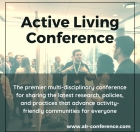Active Living Research News
ALR Conference
Becoming a Global Community
We would like thank everyone who attended, presented and participated in a very successful and engaging ALR2015 Conference. Nearly 325 delegates from many parts of the globe came together to discuss the conference theme, The Science of Policy Implementation. Consistent with previous years, nearly half of the attendees were newcomers – indicating the continued growing interest in active living. Thank you to our conference chair Daniel Rodriguez for his leadership in executing a wonderful event!
This year’s distinguished keynote, Gil Peñalosa, Founder of 8-80 Cities, shared international examples of beautifully designed and thoughtfully managed parks, transportation systems, and communities that make active living more accessible to everyone. The conference agenda also featured two panels of international experts that highlighted how research is being used across the globe to influence active living policies and community design.
For more highlights from the ALR2015 Conference, read Jim Sallis’ event re-cap. Conference presentations and abstracts will be posted to the ALR website soon.
Save the Date for ALR2016!
After many years in San Diego, we are moving across the country for ALR2016 to the Hilton in Clearwater Beach, Florida on January 31 – February 3, 2016. Please mark your calendars, spread the word, and plan to join us. The 2016 Conference is a new partnership with Elsevier. Check the ALR website for updated conference details.
ALR Resources
Making Active Living the Norm
A special issue of Preventive Medicine features papers from the 2014 ALR conference. Full text articles can be accessed via this commentary in our MOVE! blog by Keshia Pollack, who chaired the 2014 conference. The Supplement includes research papers, practice reports, and commentaries. Together the articles highlight the movement from niche to norm of active living in various sectors, with a focus on physical activity in school settings, parks and recreation, and communities.
Making the Case for Designing Active Cities
A new ALR report concludes that creating communities, transportation systems, schools and buildings that make physical activity attractive and convenient also produce a wide range of benefits, including improving environmental sustainability, economics and health. The report is an extensive review exploring a wide range of literature to understand the co-benefits of activity-friendly environments on physical health, mental health, social benefits, safety/injury prevention, environmental sustainability, and economics. Five physical activity settings were defined: parks/trails, urban design, transportation, schools, and workplaces/buildings.
Active Kids Learn Better Infographic
The new Active Kids Learn Better infographic highlights evidence on how physical activity and fitness may help school-aged children maximize their academic performance and impact the developing brain. Findings presented in this infographic come from a related ALR research brief. The infographic can be downloaded for free for print or electronic dissemination.
Popular Disparities Infographic Translated into Spanish
Our popular Do All Kids Have Safe Places to Be Active? infographic has now been translated into Spanish. We are happy to have partnered with Salud America! to co-brand this infographic, which features evidence on barriers some kids face in being able to walk, bike, or play in their schools and neighborhoods. Findings presented in this infographic come from a related ALR research synthesis.
Announcements and Other Resources
RWJF Commits to Helping All Kids Grow Up at a Healthy Weight
The Robert Wood Johnson Foundation has committed $500 million over the next 10 years to help all children grow up at a healthy weight, no matter who they are or where they live. We commend RWJF for dedicating more than $1 billion since 2007 toward reversing the childhood obesity epidemic.
PAPRN+ Advances Policy Research to Increase Physical Activity
The Physical Activity Policy Research Network Plus (PAPRN+) welcomes all interested researchers and practitioners to join the network. The group’s mission is simple: conduct and communicate policy research so it can be used by stakeholders in multiple sectors to support more physical activity for all Americans. The vision is achievable - advance policy research to increase physical activity for all Americans. Learn how to join.
Building Healthy Places Toolkit
The Urban Land Institute has released a new report, Building Healthy Places Toolkit: Strategies for Enhancing Health in the Built Environment, outlining 21 evidence-based recommendations that the development community can use to promote health at the building or project scale. The recommendations, based on the latest documentation of the need for and impact of building for health, were formulated to help developers, owners, property managers, designers, and investors understand opportunities to integrate health promoting practices into real estate development.
Get Every Kid in the Game
A new report, Sport for All, Play for All: A Playbook to Get Every Kid in the Game, outlines eight promising strategies that can address barriers limiting access to early sport activity that fosters the development of healthy children and communities. The report is authored by the Aspen Institute’s Sports & Society Program with support from the Robert Wood Johnson Foundation.
Physical Activity and Positive Youth Development
Leadership for Healthy Communities has released a policy brief examining how policies and programs to help youth be active—particularly through organized recreation and sports—can prevent childhood obesity and develop positive social and emotional skills. The report, Making the Connection: Physical Activity and Positive Youth Development, also provides a menu of policy options for leaders at the federal, state and local levels who are interested in promoting high-quality opportunities for youth in their communities.
Physical Activity: Moving Toward Obesity Solutions
The Institute of Medicine's Roundtable on Obesity Solutions is hosting a two-day public workshop titled Physical Activity: Moving Toward Obesity Solutions. The workshop will feature expert speakers and discussion on the scientific basis for a focus on physical activity in obesity prevention and treatment and will include presenters and discussants on the subject of prevention of overweight and obesity in adults and children, as well as the role of physical activity in overweight and obese populations. Register now to attend the workshop in person at the National Academy of Sciences Building in Washington, D.C. or via live webcast.







